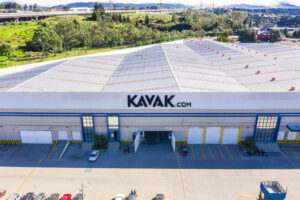
Por Mariana López
February 22, 2020
Contxto – In Mexico, Guadalajara is a city that’s pulling a lot of strings to ramp up its startup ecosystem.
For one, it’s made efforts to draw in multinational corporations like Hewlett Packard and Jabil. In 2012, the government launched its Digital Creative City (CCD) project to attract innovative industries like design, mobile app development, and media.
Moreover, local authorities are also releasing funding projects to scale up budding startups.
And as a result of all of this, Guadalajara has often self-proclaimed itself the “Silicon Valley” of Mexico. But just how much truth is there to this statement?
Three entrepreneurs weighed in on the matter during a recent event organized by Endeavor last Tuesday (18).
Their names;

Endeavor selected this trio of entrepreneurs for mentoring in different points in time. But they all share the experience of developing their projects in this part of Mexico.
Besides discussing Guadalajara’s progress as an entrepreneurial hub, the speakers also addressed its potential, and how it compares to perhaps its biggest rival in that sense, Mexico City.
In an enjoyable evening of jokes on absurd term sheets, finger foods, and the meet and greet ambiance of WeWork offices in Guadalajara, some interesting stories were shared.
After a game of hot potato with the microphone to determine who would speak first, Adalberto Flores (Kueski) took the lead.
“When we started about seven years ago,” said the Co-founder, “the investment ecosystem was underdeveloped… it was hard. It’s always been hard. I remember perfectly how in Mexico venture funds took their time to invest. Since there was less competition, these funds gave themselves the luxury of taking the time to make a decision.”
He went on to explain that it was only until investors from the United States showed interest in Kueski, did Mexican ones want to join the bandwagon.
But that wasn’t the only challenge the budding fintech faced.
Hiring developers proved to be a handful since the concept of “startup” was virtually unknown among the general population. And that led to more troubles.
So often, nosy family members would advise their kin with engineering degrees not to join Kueski. Even office landlords turned the startup away for fear of its closing and inability to make rent. Flores ultimately pointed out that while nowadays, being an entrepreneur is labeled as “cool,” in reality it’s a humbling experience due to all these rejections.
Kueski’s Co-founder summed up his beginnings with the startup as a roller coaster ride, where the highs are jet stream high, and the lows are abysmally low.
Just as any entrepreneur reading this can attest.
José Luis Nuño, Co-founder at Unima, said his biotech began ops in 2005 and there was virtually no startup ecosystem to begin with. In Guadalajara, there were public institutions and business incubators run by academics. But that was pretty much it. Venture capital was a non-existent term.
Slim pickings for a young startup.
Nonetheless, that had its unexpected perks.
“We lived in an interesting time where everything was new,” reflected Nuño. “The system learned, the ecosystem learned, and we learned too. All at the same time.”
When the time came for the startup to raise funds, there was only one source of venture capital (VC) in all of Guadalajara. And it was basically just a group of investors who may not have even been aware of what they were doing as evidenced in their negotiations with Unima.
“I recall that they gave us a term sheet offering “such and such amount of money” for 75% of the company. Obviously, we didn’t accept their offer.”
By 2015, the ecosystem had already developed further according to Nuño. But not sufficiently for Unima to raise a second funding round with investors in Guadalajara, nor Mexico City.
Looking abroad, the biotech found funding and acceleration in a little program called Y Combinator. It became the first startup from Mexico to join this renowned accelerator.
Upon returning, the ecosystem in Guadalajara developed soon after and Unima began to develop a unique mix of engineers with healthcare professionals.
For the entrepreneur, this combination is leading to groundbreaking startups and a diversified ecosystem.
When the entrepreneurs were asked what local tools and resources they used to innovate they found common ground: networks.
For Flores (Kueski) leveraging his contacts among friends helps him address general issues like raising capital as well as particular problems, like handling a demanding VC investor. He also nodded to the use of Endeavor’s friendly network of entrepreneurs to talk about anything and everything.
Interlub CEO, René Freudenberg, acknowledged the importance of innovation not just in Guadalajara, but in all of Mexico. Unfortunately, it’s still lacking in the country, despite all the innovation buzz. Though it doesn’t have to be that way.
By reconciling businesses with science-based research the state of innovation in Mexico might change. And on that note, he acknowledged that Endeavor played a role in connecting his company to research centers.
José Luis Nuño (Unima) emphasizes the diversity that can be found within Guadalajara and throughout the region. For him, the variety of ideas and backgrounds leads to a greater cross-pollination of ideas that bodes well for the future generations of entrepreneurs.
For the biotech’s Co-founder even limited access to VCs comes with an advantage when compared to Mexico City. This is so because it makes an entrepreneur more resourceful and likelier to have a more “out-of-the-box” mindset.
Flores (Kueski) took a more critical approach and said Guadalajara had identified one major advantage and a weakness.
Guadalajara had the advantage that in the past it attracted major companies like Intel and IBM, which in turn, attracted engineers. These businesses then approached universities to better prepare their students for the job market, based on these companies’ needs.
“That’s when Guadalajara became a sort of tech hub. And that’s why it’s often said Guadalajara is a sort of Silicon Valley.”
And for Flores, back when he initiated his startup seven years ago, there was a more heated competition between Guadalajara and Mexico City.
But the gap between the pair has widened since then and the Mexican capital is taking the lead in various ways.
For one it has a larger number of rising startups. Not to mention the sheer market size; Mexico City is three times larger than Guadalajara.
Plus, the fact that C-suite execs of many corporations are in “CDMX” means it’s inevitable that B2B and B2B2C founders from Guadalajara get pulled to that part of the country, even if it’s just to conduct business.
However, Flores offered a ray of light for anyone who was hoping Guadalajara could win the debate.
According to him, if the right conditions are placed, Guadalajara can become a specialized niche in tech development.
Much like how Medellín in Colombia is renowned for its programmers specialized in artificial intelligence (AI), Guadalajara can take a similar path.
Setting my personal pride aside, I can’t help but coincide with Flores.
Far too many things, markets, companies, talent, and VCs are concentrated in Mexico City, giving it the edge.
Yet, Guadalajara has come a long way from an improvised group of investors wanting a startup to sell 75% of its soul for funds. And there are many local VCs such as Redwood Ventures and FWV Ventures.
But most Mexican VCs are in the capital, and that pulls in a lot of other players from the ecosystem.
Mexico City may have won this round, and it’s unlikely that’ll be changing anytime soon.
So that only leaves one final controversial debate to discuss: do quesadillas come with or without cheese?
Related articles: Tech and startups from Mexico!
-ML

Por Yanin Alfaro
February 17, 2026

Por Israel Pantaleón
February 17, 2026

Por Stiven Cartagena
February 13, 2026